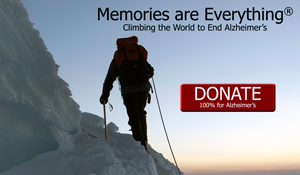|
The 2007 climb is over now. Please visit the Denali
2007 page.
This is from 2001: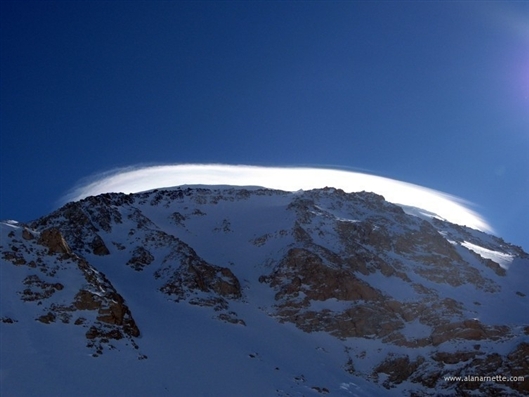
Denali, also known as Mt. McKinley, is in central Alaska - 300 miles
South of the Arctic Circle and 200 miles East of the Bearing Sea. I flew
from Denver to Anchorage drove to Talkeetna and took a bush plane to
land on the Kahiltna Glacier to begin the climb using the West Buttress
route. Denali offers some the the largest vertical gain of any mountain
on Earth. With base camp at 7,200' and the summit at 20,310', this 13,110'
of gain over twelve miles is larger than Cho Oyu (8,407) or even Everest
(10,535).
The biggest threat on Denali is the weather. It is well known for socking
you in for days with high winds and snow. And this trip was no exception.
We had pristine weather until we reached the High Camp at 17, 200 when
a front moved in that pummeled us with high winds, cold temps and blizzard
conditions. The National Park Service issued a rare "evacuate the
upper mountain" warning just as we arrived. We stayed a few more
days hoping for a break but it was not to be.
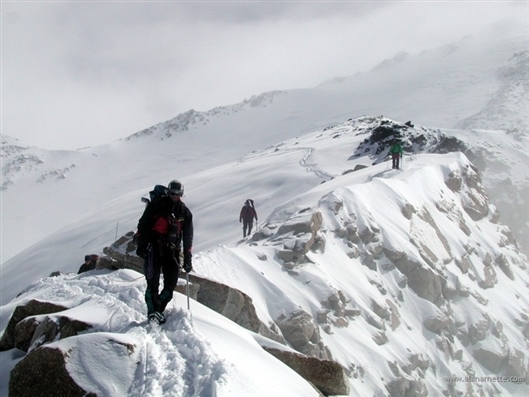 The
trip up from base camp at 7,200' was easy and straight forward. I found
the sleds not to be as big of an issue as many people said by balancing
my load between the sled and my pack. We followed the normal schedule
of establishing camps and caches so that we climbed high and slept low.
This way we moved about 1,000' a day from 7,200' to 16,200' in about
8 days. The
trip up from base camp at 7,200' was easy and straight forward. I found
the sleds not to be as big of an issue as many people said by balancing
my load between the sled and my pack. We followed the normal schedule
of establishing camps and caches so that we climbed high and slept low.
This way we moved about 1,000' a day from 7,200' to 16,200' in about
8 days.
After arriving at base camp on day 1, we set up tents, dug a 6 foot cache
and prepared for a short night. Up at 3:00AM, we packed all our gear
and moved camp up the Kahiltna glacier to 7,800'. The next few days were
spent moving gear by sled and pack to caches at 10,100' up ski hill,
then to the base of motorcycle hill at 13,300' and finally around windy
corner to 13,800. Each night we returned to the previous camp before
moving camp beyond the previous day's cache to a higher camp.
Everyone was in high spirits when we reached the basin camp at 14,200.
In fact, everyone was feeling so good, we skipped a scheduled rest day
and climbed the 2,000' headwall to establish the next cache at 16,200.
With the weather and our health holding we moved camp the next day to
the High Camp at 17, 200. This was the longest, most difficult day thus
by far for most of us.
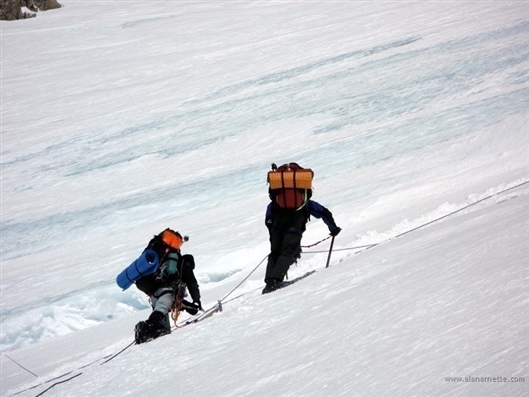 Once
at High Camp, some people began to feel the effects of the high altitude.
Symptoms ranged from mild headaches and lethargy to severe headaches,
nausea and a lack of motivation to continue. It was very disappointing
given how well everyone had been feeling. Once
at High Camp, some people began to feel the effects of the high altitude.
Symptoms ranged from mild headaches and lethargy to severe headaches,
nausea and a lack of motivation to continue. It was very disappointing
given how well everyone had been feeling.
We attempted a summit bid the following day since the weather was deteriorating
quickly and we knew it may be now or never for us. We made it to Denali
Pass where we were met with gusts of 60 mph, snow and extreme cold. When
Bill saw a lenticular on Foraker and another forming directly above us
on Denali summit, he called the climb and we returned to High Camp.
We sat out the next day in our tents with a blizzard howling outside.
The next day, a few of us were prepared to attempt the summit again,
but with high clouds, plumes off the ridge and forecast for more of the
same, we made the decision to return to base and give this trip to the
mountain.
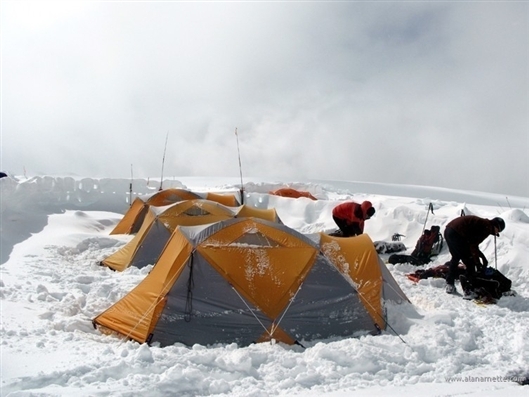 Upon
returning down the ridge to the basin camp, I hit a spot of soft snow
with my right foot and hurt my knee when I twisted between my self arrest
and my crampons. It appeared to be an ACL tear but ended up being a severe
strain and nothing was torn. My trip down the fixed lines of the headwall
was slow and painful. The following day's 7,000' return to base camp
was my longest day of the climb. I had incredible support from my teammates
- thanks guys! With some rehab, I am confident that I will be ready to
climb again soon. Upon
returning down the ridge to the basin camp, I hit a spot of soft snow
with my right foot and hurt my knee when I twisted between my self arrest
and my crampons. It appeared to be an ACL tear but ended up being a severe
strain and nothing was torn. My trip down the fixed lines of the headwall
was slow and painful. The following day's 7,000' return to base camp
was my longest day of the climb. I had incredible support from my teammates
- thanks guys! With some rehab, I am confident that I will be ready to
climb again soon.
While disappointing to come within 2,000' of the summit, we had a great
time and everyone gave it their best. I was very pleased with how my
body behaved once again at high altitudes and especially to the heavy
loads. I knew before this climb that I could control two of three critical
variables: conditioning and attitude but not the weather. In this case
two out of three was not good enough to make the summit. Next time!
|


